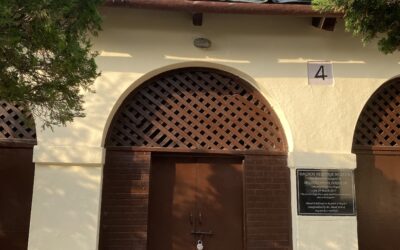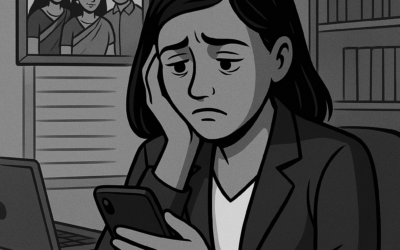Have you seen the South Korean movie Parasite that took the world by storm last year, in 2019? Or the German Sci-fi Drama Dark this year (or was it in 1987?) Why go overseas, did you enjoy Baahubali? There’s a certain “flavour” in listening to Baahubali yell a fury in Telugu, Jonas truthfully believing in perfect matches in German, or Kim lovingly expressing, “Oppa!” in Korean. There are certain things one cannot translate.
Certain words, certain feelings that can only be endeared in one language (or a muddled jumble of them if your fascinating brain has just sadly accepted them as one colossal conjunct).

Enter Aneesh – A Delhi-born Tamilian presently in Bhuj, Kutch where a good percentage of the population speak Kutchi alongside the popular language of the state i.e Gujarati.
“Arre but Aneesh, Gujarati peeps speak Hindi, no?”
Yes, they do but like I previously said – FLAVOUR! (Also, no excusable reason for one to not even attempt to learn the language of the region they are in)
Kutch Mahila Vikas Sangathan (KMVS) i.e my host organisation, amongst a rally of issues, also works on women’s safety. Safety’s definition changes quietly over time depending on how safe/unsafe one feels and, in an effort to understand this changing definition, we ran a survey through our community to understand what they think when they hear safety. Quite insightful, actually and it warrants a blog of its own.
The survey form was delivered to the organisation in English. It is a poor medium here because not many speak the language and so it was translated to Hindi, as it was the only available other official medium. Fantastically, the translation was too literary and had rather the fanciest words one wouldn’t encounter on a day to day basis. The Gujaratis surely understand Hindi, but that Hindi has to be colloquial, not literary. And so, as a Hindi speaker, I helped break down the complex wordings. My co-workers were efficiently taking notes in Gujarati/Kutchi so that they don’t forget the translations later.
People were surveyed, and now we had the forms with good long answers. Answers, in Gujarati. I think by now you can guess what followed. Yes, so the various teams translated answers back to Hindi and now since the data that was curated was going to be analysed in English, life came a full circle (that I am cancerously going to represent with a line because I can).

Fortunately, the data to be analysed was objective. So, the ‘Yes/No’ can at the maximum become ‘Haan/Naa’. However, when I say ‘analysis’ here, I only mean the one to be run on software and sparks. There were a few subjective questions in the survey form meant to help us understand what they think and want us to listen – only meant for analysis by the human brain and its heuristics.
KMVS works with a lot of communities and I get to interact with many people but majorly, I am taken care of by the sex workers’ community. And let me tell you, they are a proud community, just as they should be. Nagma-Ben* gladly agreed to be my first survey participant. She speaks only a hint of Hindi. Thankfully, there is a shared vocabulary for Hindi and Gujarati, and with context one can guess the meaning OR so I thought. This assumption was immediately shattered into blithering pieces (rather dramatic?) and I had to ask for help. The rest of the interview was completed by my teammates with me nodding along in the sides and making mental notes.
“पोथी पढ़ि पढ़ि जग मुआ, पंडित भया न कोय, ढाई आखर प्रेम का, पढ़े सो पंडित होय।”
While this couplet by Kabir falls in a different context, I was able to develop my own. The dhai aakhar prem ka (or the 4 letter word of love) is the true understanding of what love and connection mean. There was surely love, but there wasn’t connection. There is so much meaning lost in translation. One needs to recognise, no matter how perfect or verbatim the translation is, it can never be the actual sentence that came out from someone’s mouth.
There is power. There is power in taking even your name in the language you choose. Your sentences become your identity.

via Avengers : Endgame (2019)
So, now what? Can two people not connect if they don’t speak the same language? Absolutely not. In that case, they develop their own language borrowed from the experiences they share. And, like any business professional, especially those in the Hiring Committee, is going to tell you – “Body language does most of the talking”.
I cannot even begin to fathom how much meaning would have been lost had all these successive translations been required for even the subjective questions. I hope to spend enough time with Nagma-Ben, where one day, we can laugh in a language that only we shall share. I have made my peace for now.
Till then, the next time you plan to breathe in a bit of Gujarat, don’t say, “હું ગુજરાતી નથી બોલતો (Huṅ gujarati nathi bolto) – I don’t speak Gujarati; Instead, say, “હું હજી ગુજરાતી શીખું છું (Huṅ haji gujarati shikhuṅ chhuṅ)” – I am still learning Gujarati. Trust me, it makes a world of a difference.
Trivia 1: There are certain untranslatable words in every language which, when looked at from a social point of view, tell you what a certain culture values more. Like the Japanese word ‘Komorebi’ – the sunlight that passes in-between through leaves; or our own Indian ‘Jugaad’ – hack (but not exactly hack? See! Can’t translate it, after all.) I now wonder what Gujarati has to offer.
Trivia 2: I was six years old when my parents asked me to repeat a phrase in Tamil and I strongly said, “No, I am a Hindi boy”…yes, in English. Colonisers – 1; Hindi Boy – 0.
*Name changed to protect identity




This was a fun read, Aneesh! Really liked your style. I am going to keep a lookout for your future blogs.
This was a fun read, Aneesh! Really liked your style. I am going to keep a lookout for your future blogs.
A Wonderful article Aneesh! Very relatable if you are multilingual! Comical writing style to pass on a great message.
A Wonderful article Aneesh! Very relatable if you are multilingual! Comical writing style to pass on a great message.